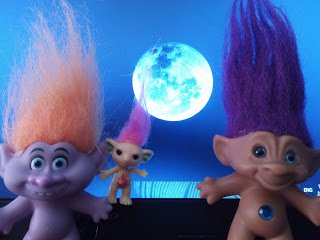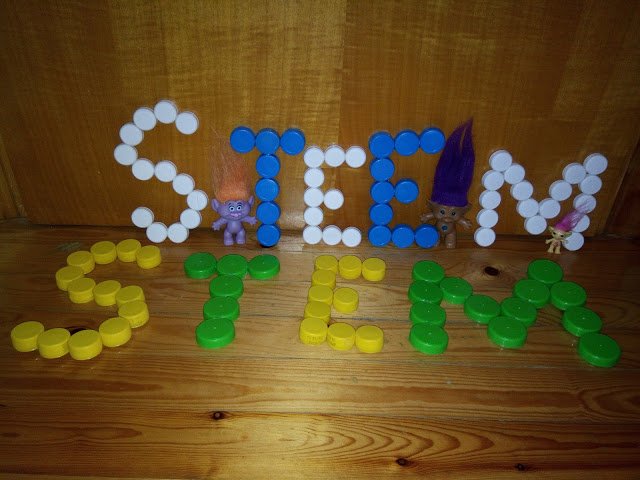If you missed it, you can check part 1, part 2 and part 3:
This post is part of a wider teaching project. We engage physics (basics of sound part 1 and part 2) and astronomy (facts about the moon). The main goal is to get young (and why not older) learners involved in a fun and easy-to-digest learning process.
Now, in case you don't remember my trolls set off on a new adventure with their little DIY rocket. Their destination was the moon. There X31, the wise troll, explained that we can't hear on the moon because the atmosphere is too weak to support the propagation of sound waves (part 1) and then he gave us some details on its composition (part 2). In the last episode the wise troll, X31, explained why gravity is less on the moon and shared a few more fascinating facts about it. Suddenly the ground started moving and the trolls hopped on their rocket to get away because they got very scared...

- What was that?! I got so scared! X54 said.
- It was a moonquake, X31 explained.
- Mooncake?
- No, silly, a moon-quake, just like an earthquake but on the moon.

- Oh! I get it. It's when the ground starts shaking and things fall off their places and buildings collapse and cracks appear everywhere from walls to roads, X42 said.
- Exactly X42. Only there are no buildings to collapse on the moon.
- And why did this thing happen? X54 wondered.
- Well, moonquakes are a bit different than earthquakes. You see, on our planet the movement and friction of plate tectonics cause the earth to shake, but on the moon the causes are different. For three years (1969-1972) the Apollo missions crew placed seismometers on the moon to monitor its activity.
- And what did they find? X54 asked.
- They reached the conclusion that there are four kinds of lunar quakes. First, there are quakes caused by meteorites that hit on it and cause vibrations, then there are quakes from the thermal expansion of its surface.
- Thermal expansion? X42 sounded confused.
- Yes, you see there are big temperature differences on the moon between day and night-time. At the end of an extremely cold (almost -250 degrees Celsius) two-week night, the sun starts heating the moon up to about 120 degrees. Then its surface starts expanding (like all bodies do when heated up), which causes vibrations on the ground.
- Woah! That must be quite a violent way to wake up, even for the moon, X54 said.
- Probably, but there can also be moonquakes caused by the gravitational interaction between the moon and the earth, the force that controls the tides. These can go as deep as 700 kilometers below the surface.

- Hmm, there are heart-shaking feelings inside the moon for our mama earth! X54 said in a foxy tone.
- Haha! Maybe, it's been with her for a veeery long time, I don't see why this can't be true, X42 said.
- Hey guys, do you wanna know another quake-fact?
- Go ahead X31, both trolls shouted.
- There is one more kind of moonquakes that scientists haven't been able to figure out yet. These are shallow quakes, that in contrast with most quakes can last for up to 10 minutes.
- Ten minutes sound like a long time. Do you think it's just the moon exercising? Maybe it's his cardio session, haha! X42 laughed.
- Or maybe it's trying to get mama earth's attention, X42 said.
- I wish I could prove either of you wrong, but science doesn't seem to have a better explanation yet, X31 shrugged his shoulders.
The trolls just had an amazing adventure on the moon and now they're travelling on their DIY rocket. What are they going to do next? Are they coming home or are they visiting more fascinating places? Stay tuned to find out soon!

References
science.nasa.gov
moon.nasa.gov
*All images by @ruth-girl - Original background image of the moon surface from: pixabay.com (CC0 - no attribution required)

Thank you for stopping by and giving this post a read. I hope you enjoyed it! If you please, feel free to pay a visit to my blog and check out my short stories along with plenty of educational posts and of course my bizarre natural phenomena series.


Until my next post,
Steem on and keep smiling, people!

